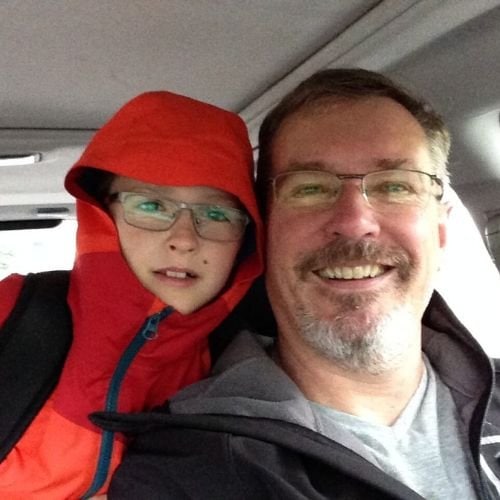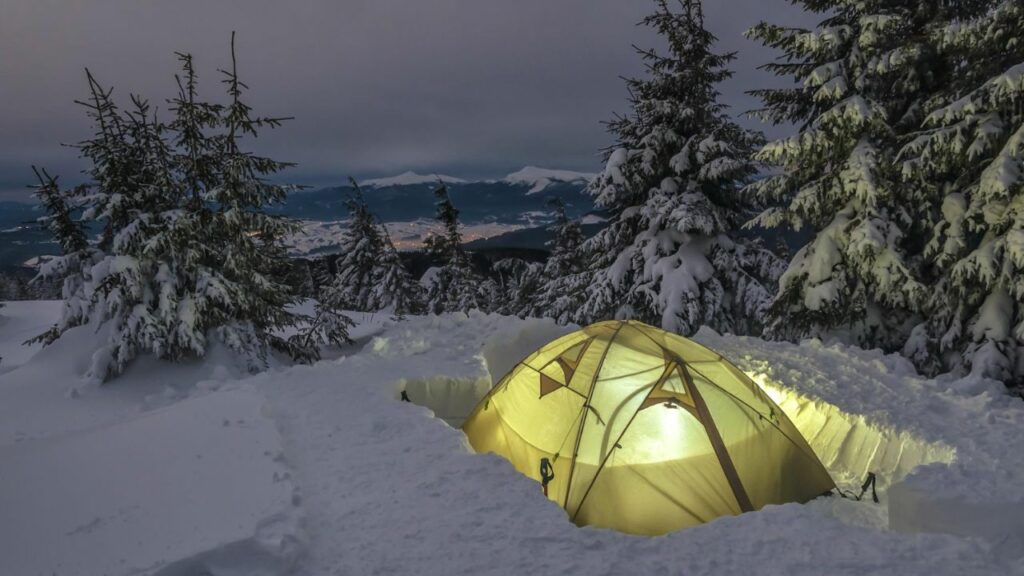We're an affiliate. We hope you love the products we recommend! Just so you know, we may collect a share of sales or other compensation from the links on this page. Thank you if you use our links, we really appreciate it!
When it comes to camping, one of the most important factors to consider is the temperature. Camping in the great outdoors can be a fun and exciting adventure, but it can turn uncomfortable or even dangerous if you’re not prepared for the weather.
So, what temperature is too cold for camping? The answer depends on a variety of factors, including your gear, experience, and personal preferences.
What Makes It Too Cold To Camp?

When it comes to camping prep, a good rule of thumb is that any temperature below 50°F (10°C) is too cold for camping without specialized gear. But this temperature is quite variable, and based on a number of other factors, such as wind chill, humidity, and your own experience and tolerance for the cold.
Inexperienced campers may find temperatures in the 30°F to low 40°F range too cold to camp comfortably, even with the right gear. So, before you head out on your cold-weather camping trip, it’s important to take the time to research the weather conditions, know what’s in store for you, and plan accordingly.
Factors that can affect how cold is “too cold” for camping include:
- Your experience level and comfort with cold weather
- The quality and type of camping gear you have, such as a cold weather sleep system and clothes layering system
- The length of your camping trip and whether you’ll be able to warm up and dry out your gear regularly or quickly if necessary
- The location and elevation of your campsite, as well as the weather conditions and forecast
If you are unsure whether a certain temperature range is suitable for your camping trip, it is always better to err on the side of caution and choose a warmer time of year or location. Or just be prepared to cut your trip short if you’re doing more shivering than sleeping.
Preparation for Cold Weather Camping
If you’re ready to do it, ready to face the cold with nothing but the gear on your back and a hearty tent, preparation is key to staying safe and comfortable. So, let’s talk some tips that can help you prepare for your trip:
Check the weather.
Before heading out on a cold-weather camping adventure, always check the weather forecast for the area you’ll be camping in. You’ll want to know the expected temperatures, wind speeds, and any chance of precipitation. This information will help you pack appropriately and plan your activities. A good snowstorm may even make you want to reschedule your trip.
Pack the right gear.
When camping in cold weather, it’s important to have the right gear to keep you warm and dry. This includes a warm sleeping bag, rated for the temps you’ll be camping in, an insulated sleeping pad with a high R-value, warm clothing, and waterproof outerwear.
You’ll also need a 3-season or 4 -season tent, depending on just how cold it’s going to be, with a rain fly or tarp to provide extra protection from the elements.
Fuel up.
In cold weather, your body burns more calories to stay warm. Make sure to bring plenty of high-energy foods and snacks to keep your body fueled throughout the day. Hot drinks and soups can help warm you up from the inside out.
Stay active.
Staying active is key to keeping warm in cold weather. Plan activities that will keep you moving, such as hiking, snowshoeing, or cross-country skiing. Just be sure to take breaks when you need them and avoid overexertion, which can lead to sweating and then feeling colder.
Plan your trip well.
When you’re going to camp in cold weather, it’s important to have a solid plan in place. Make sure someone knows where you’ll be camping and when you plan to return. Research the area you’ll be camping in and make sure you’re aware of any potential hazards, such as wildlife or icy trails.
Choose the right location.
During your planning phase, it’s important to choose a location that’s appropriate for the conditions. National parks and other public lands may have restrictions or closures during the winter months, so be sure to check before you go. Look for campsites that provide some protection from the wind and are located near a water source.
Health and Safety Considerations

When camping in cold temperatures, it’s important to consider your health and safety, and there are a few hazards you’ll face during the colder months that you won’t face during warmer months. Here are some things to keep in mind:
Health
Cold weather can be tough on your body, so it’s important to take good care of yourself while you’re out camping. These are the big three:
- Stay hydrated: Even though it’s cold, you still need to drink plenty of water. Dehydration can lead to headaches, fatigue, and other health problems. So, have a way to keep water at a nice reasonable temperature and a way to warm water to help you warm up when need be.
- Eat well: Your body needs extra fuel to stay warm, so make sure you’re eating enough. Focus on high-protein foods and complex carbohydrates.
- Stay active: Exercise can help you stay warm and boost your mood. Take a walk, do some yoga, or go for a run to get your blood flowing.
Hazards
Cold weather can pose some unique risks to your health, namely in the forms of hypothermia and frostbite.
- Hypothermia: This occurs when your body temperature drops too low. Symptoms include shivering, confusion, and slurred speech. If you suspect hypothermia, seek medical attention immediately.
- Frostbite: This occurs when your skin and tissues freeze. Symptoms include numbness, tingling, and blisters. If you suspect frostbite, seek medical attention immediately.
- Icy conditions: Be careful when walking on icy or slippery surfaces. Wear appropriate footwear and use caution. A fall in cold, snowy conditions can be a very dangerous fall to take.
Expert Tips and Tricks for Winter Camping

Winter camping can be an amazing experience, but it can also be a daunting task, especially if you’re not prepared for the cold weather. So, make sure you’re doing these things before and while on your trip to make your winter camping adventure a success:
- Invest in the Right Gear: The right gear can make all the difference when it comes to staying warm and comfortable during winter camping. You’ll need a good quality, four-season tent, a warm sleeping bag, and a sleeping pad with a high R-value to insulate you from the cold ground. Don’t forget to bring warm clothing and accessories like hats, gloves, and thermal underwear.
- Keep Your Core Warm: Your core is the most important part of your body to keep warm, as it helps to regulate your body temperature. Dress in layers, starting with a moisture-wicking base layer, followed by an insulating layer like fleece or down, and a waterproof and windproof outer layer. If you get too cold, hand and feet warmers can be place inside your clothes to warm things up quickly.
- Stay Hydrated: It’s easy to forget to drink water when it’s cold outside, but staying hydrated is key to staying warm. Drink plenty of water, tea, or hot chocolate throughout the day to keep your body hydrated and warm.
- Stay Active: Staying active is a great way to generate heat and stay warm. Take a short hike, do some snowshoeing or cross-country skiing, or even just some jumping jacks or push-ups inside your tent.
- Pack Warm Food and Drinks: Warm, hearty meals and hot drinks can help keep you warm from the inside out. Pack foods like soups, stews, and chili, and bring a thermos of hot cocoa or tea to enjoy throughout the day.
- Be Prepared for Emergencies: Winter weather can be unpredictable, so it’s important to be prepared for emergencies. Bring a first-aid kit, a map and compass, and a backup heat source like hand warmers or a portable stove.
By following these expert tips and tricks, you’ll be well on your way to a successful winter camping adventure.

We’re passionate about getting the most from your car when it comes to going on adventures and road trips. When you take one of these trips you often need more room in your car than you usually would. This is when we come in, to help you find the best roof tent for your car and needs.

